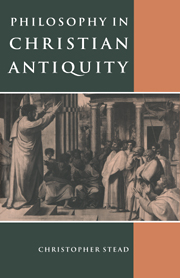Book contents
- Frontmatter
- Contents
- Preface
- List of abbreviations
- PART I THE PHILOSOPHICAL BACKGROUND
- 1 From the beginnings to Socrates
- 2 Socrates and the Platonic Forms
- 3 The philosophy of Plato's maturity
- 4 Aristotle
- 5 Epicurus and the Stoics
- 6 The Middle Platonists and Philo of Alexandria
- 7 The philosophy of late antiquity
- PART II THE USE OF PHILOSOPHY IN CHRISTIAN THEOLOGY
- PART III AUGUSTINE
- Bibliography
- Index of Names
- Index of Subjects
2 - Socrates and the Platonic Forms
Published online by Cambridge University Press: 29 September 2009
- Frontmatter
- Contents
- Preface
- List of abbreviations
- PART I THE PHILOSOPHICAL BACKGROUND
- 1 From the beginnings to Socrates
- 2 Socrates and the Platonic Forms
- 3 The philosophy of Plato's maturity
- 4 Aristotle
- 5 Epicurus and the Stoics
- 6 The Middle Platonists and Philo of Alexandria
- 7 The philosophy of late antiquity
- PART II THE USE OF PHILOSOPHY IN CHRISTIAN THEOLOGY
- PART III AUGUSTINE
- Bibliography
- Index of Names
- Index of Subjects
Summary
Plato is probably the greatest of the Greek philosophers; without question he made the greatest contribution to Christian theology. Not that he himself set out to expound a system or doctrine; his genius lay rather in raising profound and far-reaching questions in an informal style with the minimum of technical terms. To some of these questions he gave definite answers; in many cases he was content to demonstrate the complexity of a problem and the considerations to be borne in mind, partly as an exercise in rational discussion, but mainly from a deeply serious conviction of the difficulty of attaining the whole truth, and a dislike of premature solutions. The later Platonist philosophers seldom imitated this open, undogmatic approach, but made selections from his writings which seemed relatively consistent and could be defended against opposing schools. Among Christians an open, uninhibited approach to philosophy was revived for a time, especially under the influence of the Alexandrians Clement and Origen, in the third and fourth centuries, when bold speculations could be excused as ‘exercises’, gymnasiai; and in this period the influence of Platonist writers made itself felt on Christian theology. But this in turn developed a fixed dogmatic outline, reinforced by the authoritative decisions of Church councils. From that time on most Christians quoted Plato solely where he appeared to confirm established doctrines of the Church; the reality of God, his creation and providence, the heavenly powers, the human soul, its training, survival and future judgement, could all be upheld by appropriate choice of Platonic texts.
- Type
- Chapter
- Information
- Philosophy in Christian Antiquity , pp. 14 - 22Publisher: Cambridge University PressPrint publication year: 1994

